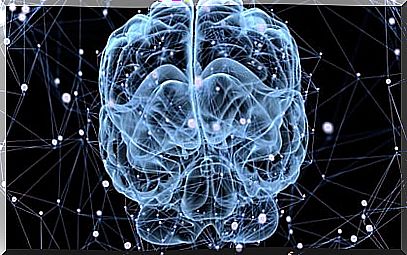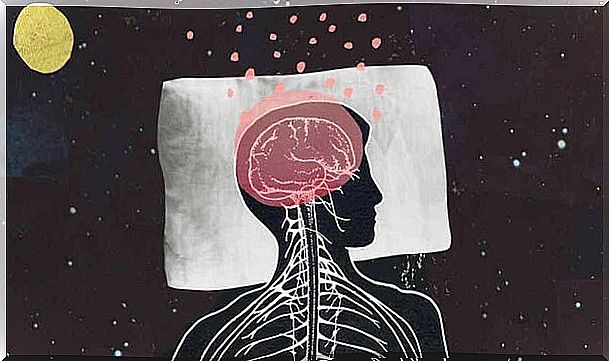Does The Brain Rest?

Does the brain rest? Often times, there are those who advise us to “turn it off”, to reduce its activity. However, we must understand that even in a calm state such as when we practice meditation or even when we rest at night, this sensational organ never stops working. Although, yes, its electrical waves and the way it exerts its neural connections usually vary.
Every living organism is in continuous operation. Each cell undergoes constant metabolic changes and, therefore, the term “rest” is clearly not viable in any organ that, obviously, is clinging to life. If the activity of a cell stops, it dies. Now, even knowing this, we wonder if our brain takes a break at some point.
The question responds to different motivations. One of them is because we often think that we have absolute control over this organ. As an entity where our reasoning, desires, projects and decisions are articulated, we come to believe that we have a certain control over it, when in reality we do not.
When we sleep he does not sleep, in fact he is incredibly active. Even more, as striking as it may seem, in those times when we experience greater stress and anxiety, he presents greater disconnection because he cannot be aware of so many stimuli. Hence we have memory lapses, hence we experience continuous absentmindedness. It is a perfect machine that deserves to be known in depth …

Does the brain ever rest?
The brain has a vital function, as do all living cells, tissues, organs, and systems in our body. Now, in addition to the simple tasks related to metabolism, protein production, oxygen consumption and other essential tasks for life, the brain has other objectives.
It is who houses those centers of power where to articulate cognition, consciousness and all the unconscious processes over which we have no control. The brain is constantly busy, both in the waking and sleeping phases. Even being in the REM phase, his electrical activity is very intense, thus reminding us that he never rests.
Dark brain energy and unconscious activity
Neurologists such as Dr. Marcus E. Raichie of Washington University in Saint Louis, Missouri, called those processes and decisions that we often carry out without being fully aware of them “dark energy”. An example: we are taking a nap and, suddenly, a fly lands on our nose.
Suddenly, and in less than a second, we are able to slap the insect away. We didn’t need to think about it; the answer is automatic. Likewise, the famous David Eagleman explains to us in his book Incognito that, to know if the brain rests, we must understand a simple aspect. If it did, we would cease to be all that we are. Furthermore, we are forced to assume that there is indeed a dark side to this body, a veiled dimension over which we have no control.
As Sigmund Freud said, the human brain and mind are largely governed by unconscious actions and tasks; those over which we have no control.

The brain in the sleep phase and the compartmentalisation of synapses
We already know that the brain does not sleep at night. It does not matter that we are immersed in the depths of that dream universe: he is still incredibly active. However, and here comes an interesting nuance, it works in a different way and “allows” some cells to rest. Giulio Tononi, an expert in the study of consciousness and sleep disorders at the University of Wisconsin-Madison, conducted an interesting study with which to demonstrate something very interesting.
- To say that the brain rests at night is a “half” mistake. It does not do it, but it presents a very intense electrical activity, however, it sends orders for a series of cells and brain regions to do so. That is, the brain allows small areas of the brain to “rest.”
- This is known as “sharing.” In this work it is explained to us that certain synapses that are not useful are turned off during the night. In this way, the next day they are reactivated in a more intense and healthy way.
- Likewise, such sharing allows activating those other areas that will facilitate the integration of the information. The same that will make up, for example, part of our long-term memory.
The brain does not rest, but you can help it work better
In addition to the classic question of whether the brain rests, it is also common for us to be curious about whether there is some way that it is more efficient. In this way, something that we must be clear about is that hyperstimulation is one of its worst enemies. Subjecting ourselves to states of stress, constant worries or always being in front of the screens of our electronic devices has a serious impact on brain health.
Therefore, the ideal is to promote activities that add it in states of harmony. There are processes that balance its functions, that stimulate it in a positive way and enhance its functions. They are as follows:
- The meditation.
- Walk.
- Daydreaming
- A 20 minute nap.
- Carry out pleasant activities: read, draw, walk in nature, have interesting conversations …
To conclude, let’s remember once again that the brain never rests. However, just because he doesn’t do it doesn’t mean we shouldn’t do it either. Following the same routines, taking care of our emotions and taking care of our sleep hygiene is key to your well-being (and ours).









